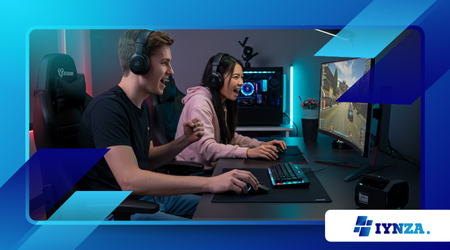Gaming Couples: How to Share the Hobby Without Conflict

Gaming is one of the most immersive and rewarding hobbies—but when it becomes a shared activity between partners, it can also create unexpected tension.
Anúncios
Different playstyles, preferences, or time investments can cause friction. And while playing together sounds like a dream, it often requires conscious effort to make it feel fun, fair, and fulfilling for both people involved.
Being one of the many gaming couples today means finding balance between solo grind and shared fun. It means knowing when to queue together, when to play apart, and how to communicate without turning every match into a competition—or a passive-aggressive scoreboard.
In this article, we’ll explore how to make gaming a source of connection rather than conflict, and how couples can enjoy the hobby together without turning it into another battleground.
Respect Different Playstyles
Just because you’re a couple doesn’t mean you’re the same kind of gamer. One of you may love PvP intensity, the other prefers cozy world-building. Trying to force a shared experience without understanding those differences is a recipe for frustration.
Take time to talk about the types of games each of you actually enjoys. Ask what stresses your partner out in games, and what energizes them. Respect if they want to game to relax while you’re trying to climb the ranked ladder.
Shared gaming should never feel like pressure. It should feel like play.
Read also: How to Stay Mentally Strong in Competitive Gaming
Set Clear Time Expectations
One of the biggest sources of conflict among gaming couples isn’t the game itself—it’s when to stop. When one partner expects quality time and the other is “just finishing a match” for 45 minutes, tension builds quickly.
Set boundaries together. If one of you needs time to grind or finish a raid, communicate it clearly and set a timer. Respect each other’s personal game time and offline moments equally.
Example 1: One couple agreed to a simple rule: weeknights are for solo gaming, weekends are for shared sessions. It created space and structure—and reduced resentment dramatically.
Choose Cooperative Games Over Competitive Ones
There’s a big difference between playing with your partner and playing against them. While a little friendly competition can be fun, it can also cause friction if one of you is more skilled or intense than the other.
Focus on games that require teamwork, not rivalry. Co-op games like It Takes Two, Overcooked, or Portal 2 can turn gaming into a problem-solving adventure instead of a scoreboard war.
When the game becomes about working together, it reinforces trust, patience, and communication—everything a good relationship needs.
Don’t Coach Without Consent
Offering feedback on your partner’s play can quickly become patronizing—even if you mean well. Unsolicited advice, especially in the middle of a game, often feels like criticism.
Unless they explicitly ask for help, let your partner play their way. And if you’re the one being coached constantly, speak up kindly and set a boundary.
Example 2: A couple playing Apex Legends agreed to review matches together afterward, instead of mid-game. That small change turned tense moments into learning opportunities—without the sting.
Talk About Frustration Outside the Game
If a gaming session ends with one of you annoyed, don’t pretend it didn’t happen. Ignoring that energy can sour the rest of your day or weekend.
Instead, agree to check in afterward. Ask what went wrong. Share how you felt. Don’t accuse—reflect. Often the issue isn’t the game, but how each person felt during the moment.
That five-minute conversation can prevent weeks of silent irritation or avoided sessions.
Gaming as a couple is like dancing. You need rhythm, communication, and awareness of each other’s movement. If one person leads too hard or steps off-beat, the whole flow breaks. But when you move together, you create something better than what either could do alone.
A Statistic That Reveals the Reality
More couples than ever are gaming together, but not all of them are thriving in the process. A 2024 survey conducted by PlayTogether Labs analyzed over 1,500 gaming couples across North America and Europe and found that 62% of respondents who played games with their partners at least twice a week reported higher relationship satisfaction.
These couples emphasized that gaming became a meaningful ritual—something they looked forward to, a way to bond after long days, and even a method to improve communication.
However, the same study revealed a sharp contrast when one partner felt excluded or overshadowed during sessions.
In couples where one person dominated the game choice, dictated the pace, or frequently criticized the other’s gameplay, relationship satisfaction dropped by 34%. These sessions, instead of bringing them closer, became another source of conflict.
The data makes one thing clear: it’s not just about playing together—it’s about how you play together. When both voices are valued, when the hobby is mutual and inclusive, gaming becomes a strength in the relationship.
But when one person takes control while the other just tries to keep up, it stops being fun—and starts becoming a chore masked as quality time.
Conclusion
Being one of the many gaming couples today can be a source of laughter, connection, and adventure—but only when approached with empathy and intention. You don’t need to game the same way. You just need to game together with care.
Respect each other’s preferences. Choose collaboration over competition. Communicate clearly before, during, and after the match. And most importantly, make sure the hobby stays fun for both sides.
Because when you game with someone you love, the win isn’t on the screen—it’s in how you play together.
FAQ
1. What are the best games for couples to play together?
Co-op games like It Takes Two, Stardew Valley, Overcooked, and Portal 2 are great for shared experiences.
2. What if one of us is much better at games than the other?
Focus on games that minimize skill gaps, or take turns letting each other lead. Avoid high-pressure titles together.
3. How do we stop gaming from interfering with relationship time?
Set clear time boundaries and prioritize non-gaming quality time regularly.
4. Is it okay to play different games separately?
Absolutely. Gaming solo can be healthy for each partner—just make sure expectations are clear.
5. How do we handle in-game arguments or tilt?
Pause, take breaks, and talk about it afterward. Let conflict stay in the game, not in the relationship.
